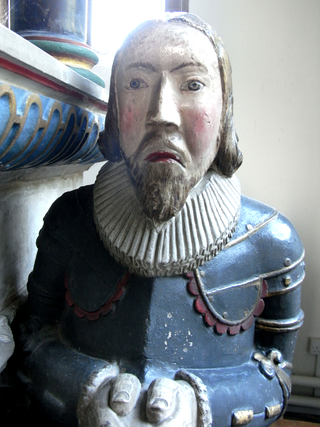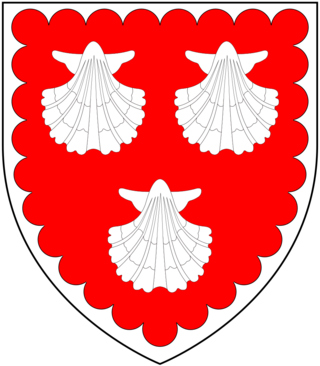
Lionel Cranfield, 1st Earl of Middlesex was an English merchant and politician. He sat in the House of Commons between 1614 and 1622 when he was raised to the peerage as Baron Cranfield.

George Manners, 7th Earl of Rutland of Fulbeck Hall, Lincolnshire was an English landowner and politician who sat in the House of Commons between 1604 and 1626. He inherited a peerage as Earl of Rutland in 1632.
Sir Richard Bulkeley of Beaumaris, Anglesey and Lewisham, was a Welsh politician and courtier of Elizabeth Tudor, who sat in the House of Commons of England in 1563 and from 1604 to 1614.
Henry Nevill, de facto 9th Baron Bergavenny was an English iron founder, soldier and politician who sat in the House of Commons at various times between 1601 and 1622 when he inherited the Baron Bergavenny peerage.
Callington was a rotten borough in Cornwall which returned two Members of Parliament to the House of Commons in the English and later British Parliament from 1585 to 1832, when it was abolished by the Reform Act 1832.

Sir Francis Popham (1573–1644) of Wellington, Somerset and Littlecote, Berkshire, was an English soldier and landowner who was elected a Member of Parliament nine times, namely for Somerset (1597), Wiltshire (1604), Marlborough (1614), Great Bedwin (1621), Chippenham 1624, 1625, 1626, 1628–29), and for Minehead (1640–1644).

Margaret Fiennes, 11th Baroness Dacre was a suo jure peeress having been created Baroness Dacre by King James I of England in 1604. She was the daughter of Thomas Fiennes, 9th Baron Dacre who was executed for murder in the year of her birth. His title and lands had been forfeited to the crown. Baroness Margaret's husband was Sampson Lennard MP.
Sir Francis Barnham (1576–1646) was an English politician who sat in the House of Commons at various times between 1604 and 1646. He supported the Parliamentary cause in the English Civil War.

Sir Walter Erle or Earle was an English landowner and politician who sat in the House of Commons at various times between 1614 and 1648. He was a vigorous opponent of King Charles I in the Parliamentary cause both before and during the English Civil War.
Sir Thomas Posthumus Hoby, also spelt Hobie, Hobbie and Hobby, Posthumous and Postumus, was an English gentleman and politician who sat in the House of Commons at various times between 1589 and 1629. A Puritan, he has been claimed as the inspiration for Shakespeare's character Malvolio in Twelfth Night.

Sir Sampson Eure was an English lawyer and politician who sat in the House of Commons at various times between 1621 and 1643. He supported the Royalist cause in the English Civil War.

Sir William Strode (1562–1637) of Newnham in the parish of Plympton St Mary, Devon, England, was a member of the Devon landed gentry, a military engineer and seven times a Member of Parliament elected for Devon in 1597 and 1624, for Plympton Erle in 1601, 1604, 1621 and 1625, and for Plymouth in 1614. He was High Sheriff of Devon from 1593 to 1594 and was knighted in 1598. In 1599 he was appointed Deputy Lieutenant of Devon. There is a monument to him in the parish church of Plympton St Mary.
Sir Samuel Sandys was an English landowner and politician who sat in the House of Commons at various times between 1586 and 1622.

Edward Fraunceys was an English politician who sat in the House of Commons at various times between 1597 and 1626. His career was hampered by his marriage into an openly recusant family.
Sir Robert More was an English politician who sat in the House of Commons from 1601.

Sir Richard Verney of Compton Verney in Warwickshire, England, was a landowner and politician who sat in the House of Commons at various times between 1589 and 1614.
Sir Talbot Bowes was an English politician who sat in the House of Commons at various times between 1593 and 1629.

Sir John Mallory of Studley Royal was an English politician.
Walter Tichborne (c.1580–1637) of Aldershot in Hampshire was MP for Petersfield from 1614 to 1621.

William Eure, 2nd Baron Eure was a Tudor-era English nobleman, soldier, and official in the Scottish Marches.











